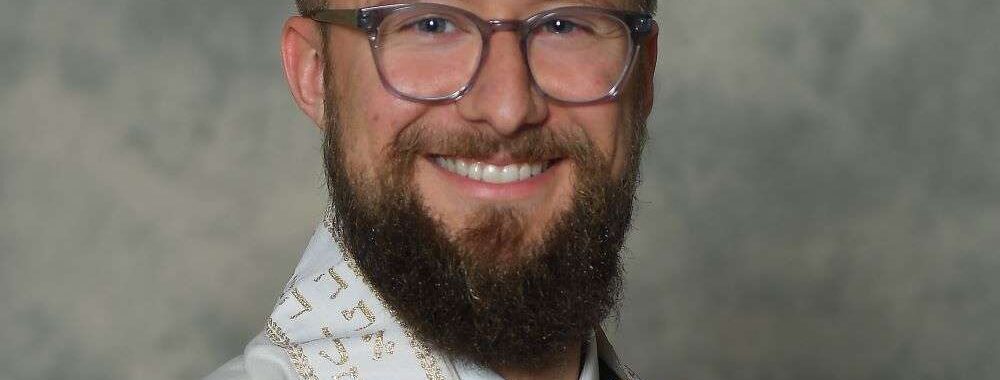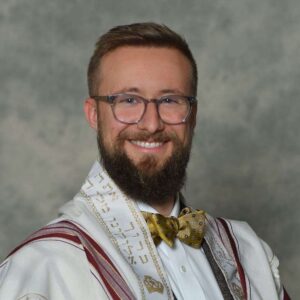By Rabbi Matthew Derrenbacher
Not long ago, we began the book of Numbers, Bamidbar, which opens with God speaking to Moses in the wilderness of Sinai and commanding him to take a census of all the men age 20 and above, who were able to serve in defending the People in their wanderings through the wilderness. Although this census is quite exclusionary and fails to take the diversity of the People into account, it does a beautiful job of breaking up the Torah narrative, allowing our ancestors to reflect on the journey up to this point. Our previous book, Leviticus, or Vayikra, begins with God calling out, crying out, and yearning to be in a relationship with the People as they embarked on their journey into the wilderness of discernment – having just come out of slavery and entering into freedom, discovering who they are, how they want to interact with their world, and how they choose to be in relationship with this God that their ancestors knew and who saved them from Egypt. Through the course of the book, our ancestors learn and grow on their journey, so by the time we get to the beginning of Numbers, God gives them a quick reminder to take stock.
As I return home to Louisville to serve as Assistant Rabbi at The Temple, I couldn’t help but accept the Torah’s invitation to take stock and look back at my journey to this point, as well as to use it as an opportunity to re-introduce myself to the community in my new role. I moved to Louisville in 2014 for graduate school and quickly called The Temple home. I studied Torah with Rabbi David and Dr. Johanna Bos, began working as the Rabbinic Assistant for Rabbi Joe Rooks Rapport and Rabbi Gaylia R. Rooks, and taught in the Religious School. I also sang in the Shir Chadash choir at The Temple, which is how I was first introduced to my wife, Brittany. As my love of Jewish life and learning grew and my thirst for Jewish knowledge and experience became unquenchable, I decided to take the leap and attend rabbinical school.
During my first year at the Hebrew Union College-Jewish Institute of Religion, I lived in Jerusalem and had the incredible opportunity to explore Israel. Once I returned home to the States, I had the privilege of serving as student rabbi for incredibly diverse congregations in Texas, Michigan, Indiana, Ohio, Missouri, and New York. I also spent my summers at HUC serving as a Chaplain Candidate for the United States Air Force. Despite all my travels to different states and serving in several rabbinic roles, my wife and I continued to call Louisville home. After ordination, I had the opportunity to serve Congregation Beth Shalom in Columbia, MO as their solo rabbi. As the only community synagogue in the city, I had the privilege of serving an exceptionally diverse group of Jews – providing services in both the Reform and Conservative traditions to meet the varying needs of the community and working hard to develop a robust foundation for their continued development and growth. All the time I spent away from Louisville helped me grow and evolve as a person and as a rabbi, and I am so deeply grateful for all those experiences.
In taking a moment to reflect on all the experiences that led me back home, I also pause in gratitude that I am home with friends and family and have the opportunity to serve a congregation that I call home alongside Rabbi David – one of my dearest friends and mentors. I have often found that reflection can bring up a lot of different emotions – happiness, sadness, excitement, longing, grief, joy, and gratitude.
The book of Numbers, Bamidbar, begins with an invitation to take stock, to reflect on all the things that came before in the story. But perhaps the invitation to reflect is just the beginning – maybe the Torah is really inviting us to step into gratitude for all the moments that have led us to this moment in our lives. Some of those moments may have brought us joy, caused us grief, made us angry, brought us comfort, or experienced so many more beautiful and complicated feelings that we as humans get to uniquely experience. In this way, the command to take a census at the beginning of the book is a reminder for us to step into gratitude – to recognize everything that has brought us to this moment and made us who we are today. Wherever you may be reading this, if you’ve managed to muddle through this far, I invite you to take a special shehechieyanu moment for yourself – sitting in gratitude for who you are today, I know I am. Thank you for welcoming me home.
Matt Derrenbacher is Assistant Rabbi at The Temple




